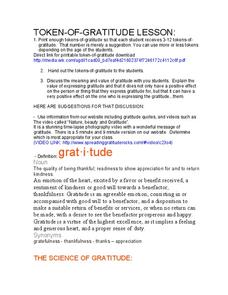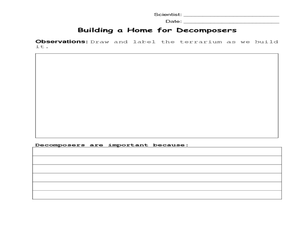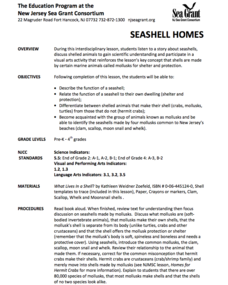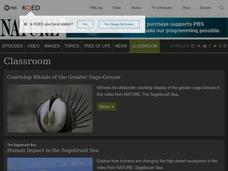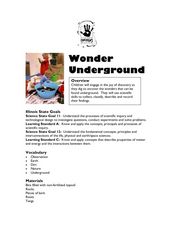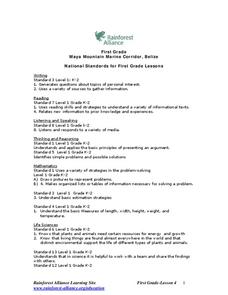Curated OER
Objects of Adornment
Students identify adornments as a form of art. In this art and jewelry lesson, students view portraits of two historical princess noticing their adornments, then draw a person in their life focusing on the adornments they wear.
Curated OER
Animation Flip Books
Students investigate examples of animation made from a flipbook technique in order to learn how to create their own flipbook and to learn how this process looks like an animated cartoon. In this animation lesson, students will observe...
Curated OER
The Desert Alphabet Book
Students explore world geography by researching a science book with their classmates. In this desert identification lesson, students utilize a U.S. map to locate the geographical locations of deserts. Students create an oral report based...
Curated OER
Flower Power: Kansas Quarter Reverse
Students examine the Kansas quarter reverse and explore the basic needs and life processes of plants. They take a nature walk around the school and draw living and non-living things. In the classroom the sort the specimens collected into...
Spreading Gratitude Rocks
Token of Gratitude
What would the world be like if everyone expressed gratitude? Pupils explore the concept by watching a motivating time-lapse video. Scholars express appreciation by handing out tokens of gratitude, and then write about their...
Curated OER
Dinosaurs 1: Where Are the Dinosaurs?
Students explore dinosaurs and their extinction. In this dinosaur lesson, students view dinosaur websites and videos to gain an understanding of the world long ago. Discussion questions follow. Students create a paper mache dinosaur egg.
Curated OER
Let's Sort a Salad
Learners examine edible plants by identifying salad ingredients. In this botany lesson, students discuss the different vegetables that can be eaten in a salad and draw them on a worksheet. Learners review vegetable vocabulary and examine...
Curated OER
What Do Snails Eat?
Students conduct a food choice experiment with snails, recording the results on a chart to determine what snails eat. In this what do snails eat lesson, students color a picture of snail anatomy, perform the experiment with 3 food...
Curated OER
De-composers - Terrarium
Learners explore the environment by building a mock ecosystem. In this rainforest analysis lesson, students define many environmental and rainforest related vocabulary terms and discuss the current status of our planet's rainforests....
Curated OER
Forest Ecology
Learners examine the different plants and animals in British Columbia. In this forest ecology lesson students explore how ecosystems work, classify animals and investigate food webs and chains.
Curated OER
Decomposers- Nurse Logs
Students investigate temperate forest ecosystems. In this environmental activity, students discover different forms of decomposition and its effect on the environment.
Curated OER
Seashell Homes
Pupils listen to a story about seashells. They discuss shelled animals. Learners describe the function of seashell. Pupils relate the function of a seashell to their own dwelling. They differentiate between shelled animals that make...
Curated OER
Adaptable Mandibles
Young scholars define adaptation and highlight example of adaptation in birds and other animals. They study feeding techniques of seabirds and investigate the effect that trash has on wildlife.
Curated OER
Characteristics of Snakes and Turtles
Students examine the characteristics of snakes and turtles and compare/contrast reptiles with mammals. They watch a video, answer discussion questions, complete information charts, conduct Internet research, and create a habitat diorama.
Curated OER
Vermicomposting
First graders investigate composting. In this biology lesson plan, 1st graders identify ways to use garbage as fertilizer. Students examine soil and compost matter as well as the role of worms in the dirt.
Curated OER
How Do We Explore Strange Environments?
Young scholars identify and label the different parts of a robot, rover, or a spacecraft. They discuss and record all of the features their robot will need to accomplish its mission and be able to explain why they chose these features...
Curated OER
Woodland Animals and Their Habitat
Students explore the natural environment through a video and nature sounds tape. They keep journal's of the unit's activities and vocabulary terms. They play a web of interdependence game and compose a list of forest animals and write...
Curated OER
Wonder Underground
Students classify and record objects they find "underground." In this observation instructional activity, students dig into bins filled with soil and encounter various objects such as bark, twigs, etc. Students classify their findings.
Curated OER
Observing Plants
Students identify how plants affect the survival of a caterpillar and what plants need to survive. They plant three bean seeds in the three containers, placing two containers at a sunny window and the third one in a dark closet and label...
Curated OER
Plants and Animals
Students find common needs between plants and animals. In this plants and animals lesson students compare that both plants and animals need food and water. They also find the differences between plant and animal needs.
Curated OER
Do Plants Need Water?
First graders observe the effects of varying amounts of water, sun, and air on lima bean plants. They also predict and describe their outcomes in a written report.
Curated OER
My Hometown
Students identify the basic requirements needed for survival and identify the resouces needed for survival that are found within their own community. They use craft materials to create a model of it and then. create a color key to...
Curated OER
Meeting our Basic Needs
Learners brainstorm the basic needs of the community and create a chart. In this volunteerism lesson, students recognize people in the community who have given charity in the community. Learners read biographies of these charitable...
Curated OER
Who Takes Care of the Maya Forest Corridor?
First graders study the animals in the Maya Forest Reserve. In this conservation lesson, 1st graders create a graph to compare the environment of animals to their own. They design a 3D model of these two environments.




